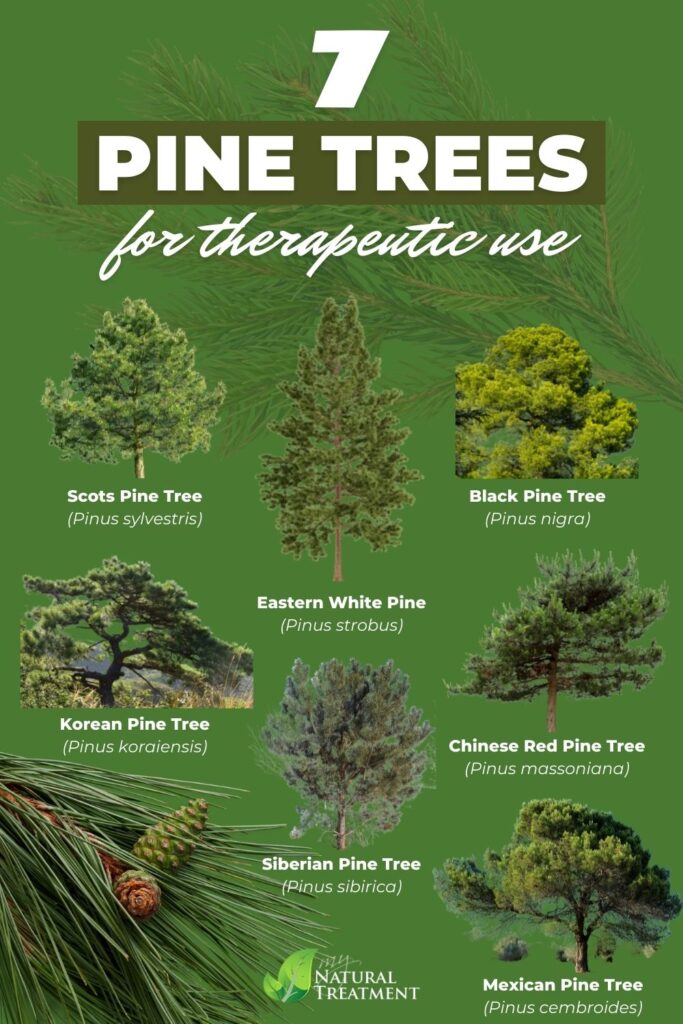Want to learn how to make pine needle tea at home? Continue reading and discover a powerful pine needle tea recipe.
Pine needle tea has become increasingly popular over the last couple of years, mostly due to its powerful detoxifying anti-antiviral properties. Indeed, pine needles contain shikimic acid, a key plant metabolite generally utilized as a starting material for the industrial synthesis of the antiviral Oseltamivir. But it also has proven anti-blood clot and antithrombotic properties. Pine needles contain shikimic acid, and thus the tea made from pine needles is a valuable natural medicine in need. Before we show you how to make pine needle tea, here is what pine trees are good for tea and how to harvest pine needles.

In This Article You Will Find:
How to Harvest Pine Needles
Pine needles can be harvested all throughout the year, as pine is an evergreen tree. However, the best time of the year to harvest pine needles is during winter, when these needles contain the highest quantity of terpenes, specific essential oils. To prepare the most potent pine needle tea, you should use freshly-picked pine needles. However, if you can’t pick fresh pine needles every other day, keep the pine needles in the fridge to stay fresh as long as possible. Separate the pine needles from the freshly picked pine branches before use.
For later use, spread the pine needles on a flat clean surface to dry out naturally. After complete drying (they crack when you bend them), you can store the pine needles in paper bags or sealed glass jars for later use.

Pine Tree Types for Therapeutic Use
When looking to gather fresh pine needles, know that Pinus is a generic name for over 80 species of pine trees. Here are some of the most popular pine trees that can are used for their therapeutic properties:
- Eastern White Pine (Pinus strobus)
- Scot pine (Pinus sylvestris)
- Black pine (Pinus nigra)
- Siberian pine (Pinus sibirica)
- Korean pine (Pinus koraiensis)
- Chinese white pine (Pinus armandii)
- Chinese red pine (Pinus massoniana)
- Mexican pine (Pinus cembroides)
- Colorado pine (Pinus ponderosa)
- Himalayan pine (Pinus wallichiana)
- Yellow pine (Pinus jeffreyi)
How to Make Pine Needle Tea
Separate the pine needles from the branches and finely chop them on a wooden board. The pine needle tea must be prepared immediately after chopping the pine needles, because, in contact with the air, most of the healing essential oils evaporate quite rapidly. Pour a cup of boiling water (250 ml) over a spoonful of chopped pine needles (15 g). Simmer on low heat, for about 10 minutes, after which strain and drink as hot as possible.
Boost the beneficial effects of this tea by adding a teaspoon of raw honey (or make your own pine needle honey) and a pinch of cinnamon powder, or half a stick of cinnamon. Enjoy three cups of pine needle tea a day, before meals. If you haven’t harvested your own pine needles, you can find good-quality pine needles below.
Pine Needle Tea Benefits
Pine needle tea is used as an adjuvant in the treatment of lung diseases because it is a natural expectorant, reduces persistent coughs, and successfully relieves flu symptoms. It also induces sweating, reduces fever, and is a fantastic natural antiviral and antibiotic. In addition, pine needle tea provides the body with vitamins and minerals and thus boosts natural immunity.
Similarly to pine needle tea, spruce needle tea – prepared in the same way – is an exceptional disinfectant of the digestive system, has anti-diarrheal properties, and soothes gastric mucosa. While fir needle tea helps with abnormal bleeding and fights respiratory tract infections, due to its anti-inflammatory, antiseptic, antibacterial, and mucolytic properties.

Pine Needle Tea with Sea Buckthorn
To further boost the therapeutic properties of your pine needle tea, you can add sea buckthorn berries to it. Here is how to make this healing tea at home, and what makes it so special.
Ingredients
- 30 g of pine needles (about two tablespoons)
- 10 g of dried and chopped sea buckthorn berries (about two teaspoons)
Preparation & Use
Finely chop the pine leaves, then pound them in a mortar with a pestle or in a deep bowl, using a wooden spoon. To turn it into a smooth paste, add a teaspoon of boiled and cooled water or distilled water when pounding. Add the pine needle paste and the dried and chopped sea buckthorn berries into an enameled pot, and pour 500 ml of boiling water over them. Simmer on low heat for 15 minutes, gradually adding the water that evaporates.
After you are done boiling, steep the decoction for half an hour. Strain it and you can keep it in the refrigerator for a maximum of three days. The recommended dose is 100 ml, three times a day, after each meal. A cure lasts three weeks and, if necessary, it can be resumed after a 7-day break.
Health Benefits
This fortified pine needle tea is an excellent tonic and energizer, great for anemia, vitamin deficiency (avitaminosis), and chronic fatigue – both physical and mental. It has revulsive properties (speeds up the movement of stagnant blood from an organ to the skin), strengthens the walls of blood vessels, and contributes significantly to good oxygenation of the brain. This enhanced pine needle tea is recommended as an adjuvant in the treatment of angina pectoris and cardiac arrhythmia.
Read Also: 6 Natural Remedies for Vaccine Side Effects
Pine needle tea is a powerful antiviral, antibiotic, and blood-cleansing medicine that anyone can safely use at home. If you’ve enjoyed learning how to make pine needle tea and the enhanced recipe, please share this article so more people can use this information. Stay healthy, naturally!
Share on Pinterest ❤️


